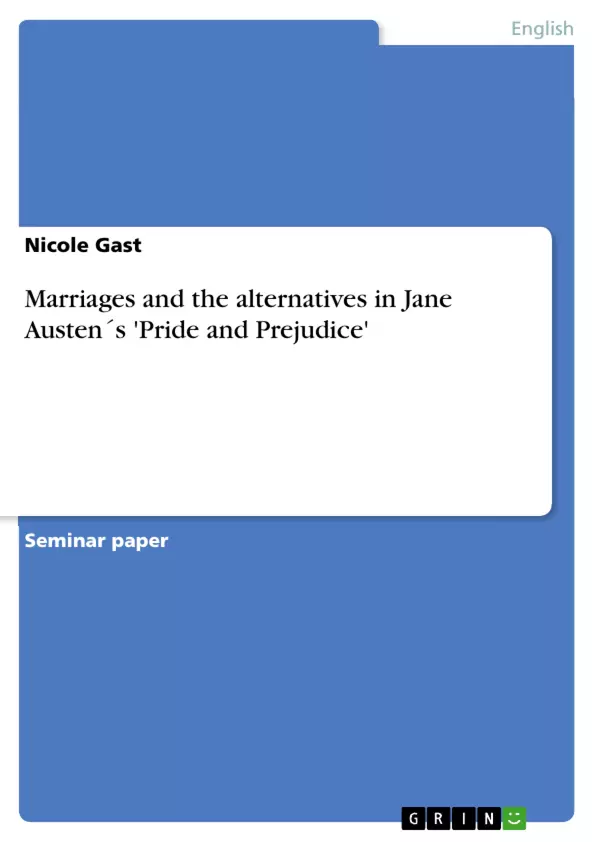In her work Pride and Prejudice, Jane Austen defines six types of marriage. Excluding the Phillipses and the Lucases, the remaining six marriages contrast each other and show Austen´s opinions on the subject of marriage. Within a social and cultural context where marriage was assumed to be of great importance, Austen uses this number of marriages to expose and satirise societal values of the age and to explore the nature of the ideal marriage.
The marriages of Elizabeth and Darcy, Jane and Bingley, Charlotte Lucas and Mr. Collins, The Bennets, Lydia and Wickham and the Gardeners form the center of the paper. What was their driving force to enter into matrimony? Can they truly be regarded as six different types of marriage and if so – which type of marriage did Austen favour herself? As an introduction, the paper gives an insight into the meaning of and the various reasons for marriage in the Victorian era and presents the alternatives for women if an eligible partner was not in sight.
Inhaltsverzeichnis (Table of Contents)
- Introduction
- Marriage in Victorian Age
- Reasons for Marriage
- Alternatives to Marriage
- The Marriages in Pride and Prejudice
- Elizabeth and Darcy
- Jane and Bingley
- Charlotte Lucas and Mr. Collins
- The Gardiners
- Lydia and Wickham
- The Bennets
Zielsetzung und Themenschwerpunkte (Objectives and Key Themes)
This paper examines the various types of marriage portrayed in Jane Austen’s Pride and Prejudice, exploring the social and economic pressures that influenced marriage decisions in the early 19th century. By analyzing the six distinct marriages depicted in the novel, the paper aims to understand Austen’s perspective on the institution of marriage, her critique of societal norms, and her exploration of the ideal marriage.
- The social and economic significance of marriage in Jane Austen's time
- The various motivations and pressures that influenced marriage choices
- The different types of marriages portrayed in Pride and Prejudice
- Austen’s critique of societal expectations and values surrounding marriage
- The concept of the ideal marriage as presented in the novel
Zusammenfassung der Kapitel (Chapter Summaries)
The introduction sets the context of marriage in Jane Austen's society, highlighting the crucial role it played in women's lives. The paper focuses on the six central marriages in Pride and Prejudice, exploring the motivations behind each union and analyzing their distinct characteristics.
The second chapter delves into the realities of marriage in the Victorian era, emphasizing its economic significance for women. It explores the societal expectations and pressures that shaped marriage decisions and discusses the alternative paths available to women who chose not to marry.
The third chapter analyzes each of the six marriages in Pride and Prejudice, focusing on the unique circumstances, motivations, and consequences of each union. These analyses will highlight Austen's insights into the complexities of human relationships and her critiques of societal norms.
Schlüsselwörter (Keywords)
The central focus of this paper is on marriage in Jane Austen's Pride and Prejudice, examining its social and economic significance in the early 19th century. The paper explores themes of societal expectations, gender roles, love, money, social status, and the ideal marriage.
Frequently Asked Questions
What are the six types of marriage defined in Jane Austen's 'Pride and Prejudice'?
The novel depicts the marriages of Elizabeth and Darcy, Jane and Bingley, Charlotte Lucas and Mr. Collins, the Bennets, Lydia and Wickham, and the Gardiners. Each represents a different social or economic motivation.
What was the social and economic significance of marriage in the early 19th century?
In Austen's time, marriage was the primary means of economic security for women. It determined their social status and financial stability, as professional alternatives for women were extremely limited.
How does Jane Austen use these marriages to critique her society?
Austen uses the variety of unions to satirize societal values, such as the obsession with wealth and status, and to explore the complexities of human relationships under economic pressure.
What does Austen consider the 'ideal marriage'?
The paper explores how Austen favors marriages based on mutual respect, intellectual compatibility, and genuine affection, such as the union between Elizabeth and Darcy, contrasted against purely economic or impulsive marriages.
What were the alternatives for women who did not marry in the Victorian era?
The paper discusses the limited and often difficult paths available to unmarried women, who frequently faced financial dependence on relatives or low-status employment.
- Citar trabajo
- M.A. Nicole Gast (Autor), 2005, Marriages and the alternatives in Jane Austen´s 'Pride and Prejudice', Múnich, GRIN Verlag, https://www.grin.com/document/49805



